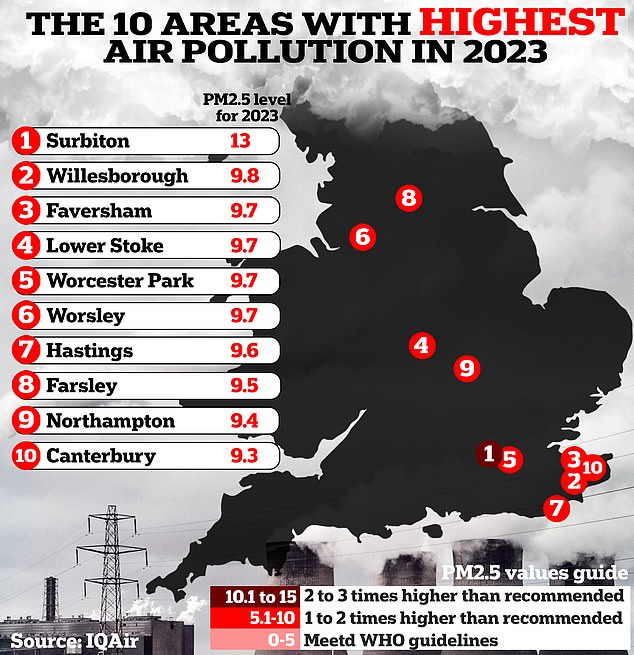Now pollution could be the cause of yet another debilitating condition – following a bombastic link with autism
Air pollution can be the cause of eczema.
Research shows that people who live in heavily polluted cities are at greater risk of developing the condition.
According to the same study, they are also more likely to have flare-ups when air quality is considered ‘moderate’ – which is typically observed in places including London and New York.
It comes just days after experts found that air pollution women breathe during pregnancy may be linked to a greater risk of autism in their offspring.
In this new study, US researchers followed more than 286,000 adults in more than 780 areas and asked them about their general health.
The average levels of particles less than 2.5 micrometers in diameter (PM2.5) near their homes were also assessed.
These are the smallest microscopic particles in the air that can penetrate deep into the tissue to have is linked to health problems such as heart disease and dementia.
Factors that could distort the results were also taken into account, such as food allergies and smoking behavior.
Research shows that people who live in heavily polluted cities are at greater risk of developing eczema

This map shows the 10 areas with the highest levels of air pollution recorded in 2023. These areas had almost double or triple the levels of particulate matter recommended by the World Health Organization
Researchers at Yale University in Connecticut found that for every 10 micrograms per cubic meter increase in PM2.5, eczema rates more than doubled.
Lead author of the study and assistant professor of dermatology at Yale University, Jeffrey Cohen, said: ‘In more polluted areas of the country, there was more eczema.’
Writing in the diary PLOS ONEThe researchers also added: ‘Demonstrating that individuals in the United States exposed to particulate matter are more likely to develop eczema deepens our understanding of the important health consequences of air pollution.’
However, the scientists acknowledged that the study had some limitations, including only using PM2.5 data for each location from 2015.
The World Health Organization has long demanded countries take tougher measures to combat the scourge of pollution, which is expected to kill seven million people worldwide every year.
Eczema is a group of inflammatory skin conditions that cause itching, dry skin, rashes, flaky patches and infections and affects up to 25 percent of the population.
The condition can worsen to the point of becoming disabling, with inflamed skin all over the body.
At least one in ten children will develop eczema at some point, but they will usually grow out of it as their immune systems develop.
It is believed to occur in people with a common genetic mutation that leads to very dry skin.
Symptom flare-ups can also be related to allergies or caused by certain soaps or foods.
Dermatologists will usually first prescribe creams and washes to tackle dry skin, and steroid creams to reduce swelling and redness.
If these are not effective, immunosuppressants such as cyclosporine or methotrexate are given.
It comes as researchers also suggested this week that air pollution may be linked to a greater risk of developing autism.
A review of the latest scientific literature outlined how babies with a higher genetic risk for the developmental disorder who were exposed to four common air pollutants were more likely to develop the condition.
It is thought that these microscopic pollutants, when inhaled during early childhood or during development in the womb, can enter the bloodstream.
There they can bypass the brain’s protective layers, causing inflammation, changing the way nerves function and increasing the risk of disorders.
Autism rates have exploded worldwide.
Analysis shows that the number of diagnoses of the condition in Britain has risen by almost 800 percent in recent decades, while the number in the US has almost tripled.
